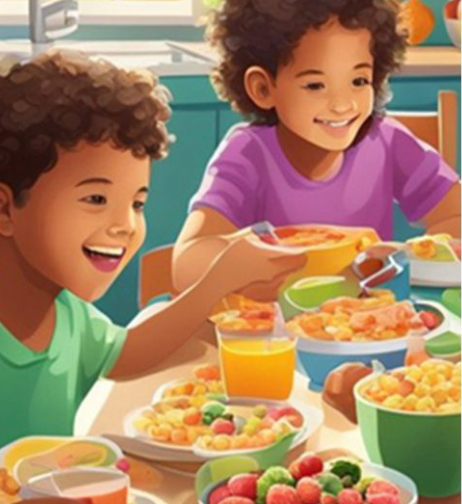
“Parenthood Is Not a Flex”: Outrage Erupts Over Controversial Take on Feeding Children

A heated conversation erupted on social media after a user, Kim Winnifred, boldly declared that “forcing your child to eat what you have and not what they like is the highest form of child abuse.” The tweet, posted on X (formerly Twitter), quickly garnered attention, with thousands of comments and reposts sparking intense debates around the responsibilities of parenthood, the line between discipline and neglect, and what exactly constitutes child abuse in today’s world.
Winnifred’s stance was clear and unapologetic. In her post, she wrote, “Forcing your child to eat what you have and not what they like is the highest form of child abuse, don’t do it.” Her words struck a nerve, not just for their bluntness, but for what many viewed as a redefinition of a concept traditionally tied to far more severe acts of violence or neglect. While some applauded her sensitivity to children’s autonomy and emotional needs, others felt she had gone too far, minimizing real cases of child maltreatment.
Adding to the conversation, another user, @blackboyrizzy, responded in agreement: “So true. You shouldn’t bring kids into the world if you can’t give them what they want and need.” Winnifred followed up with a second post: “Facts! Parenthood is a responsibility, not a flex. Kids deserve love, stability, and security.” These follow-up remarks only fanned the flames of an already blazing debate.
Critics didn’t hold back. “This is the most entitled nonsense I’ve read today,” one commenter wrote. “Parents don’t always have the luxury to make five different meals for picky children. Sometimes you eat what’s available or go hungry. That’s called life.” Others echoed this sentiment, highlighting economic hardship and cultural norms where children are raised to eat what is cooked without question. “So if I cook rice and stew and my child says they want pizza, and I don’t provide that, I’m an abuser now?” another user asked rhetorically. “Be for real.”
Yet, supporters of Winnifred’s viewpoint dug their heels in, saying the issue is not about spoiling kids but about respect and emotional intelligence in parenting. They argued that food is deeply personal, tied to comfort, autonomy, and psychological safety. “Imagine being forced to eat something that disgusts you, every day, just because someone older than you says so. That’s traumatic,” one parent shared. Others recounted their own childhood experiences of being punished for refusing to eat, describing how it led to disordered eating, anxiety, and long-term aversions.
Professionals also weighed in. Child psychologists on the platform noted that while Winnifred’s language might be extreme, the core idea touches on a valid concern. Dr. Tope Adebayo, a child development specialist based in Lagos, explained in a now-viral thread, “There’s a growing body of research that suggests the way we feed children has long-term effects on their relationship with food, body image, and emotional regulation. Coercion, shame, or force-feeding can have damaging effects—even if well-intentioned.” However, he cautioned against equating every uncomfortable parenting experience with abuse. “Words matter,” he emphasized. “Not every mistake or lack of resource is abuse. We must be careful not to dilute the meaning of serious terms.”
The debate has reignited broader discussions on the demands of modern parenting, especially in a time where economic instability collides with rising expectations for emotional attunement and gentle parenting practices. For many Nigerian families—and indeed households across the world—providing even one balanced meal a day is a financial stretch. In such settings, the idea that children should only eat what they “like” can feel unrealistic, if not outright absurd. Still, others believe the conversation opens the door to a more compassionate, child-centered approach to caregiving.
There’s also the question of class and privilege. Several users pointed out that the ability to cater to a child’s dietary preferences assumes a certain level of comfort and abundance that many families simply don’t have. “It’s easy to preach about options when you have options,” one user noted. “But when you’re boiling garri water and adding Maggi just to fill a stomach, choice is a luxury.” The comment received hundreds of likes and shares, with many echoing similar sentiments.
Still, advocates like Winnifred are not backing down. In later tweets, she clarified that her point was not to guilt struggling parents, but to challenge the normalization of dismissing children’s needs under the guise of discipline. “You can teach discipline without force,” she wrote. “You can raise strong kids without traumatizing them. Respecting children doesn’t mean letting them rule the house—it means seeing them as human.”
As the topic continued to trend, many parents began sharing their own approaches to mealtime compromise. Some discussed the “one family meal” rule with a twist—offering a small range of options within a budget. Others described involving children in the cooking process, giving them a sense of control and participation. “If my daughter helps make the vegetable soup, she’s more likely to eat it,” one mother shared. “We talk about the ingredients, taste it together. That’s parenting.”
The viral exchange also triggered a flurry of think pieces and blog posts, with headlines like “Parenting in the Age of Social Media Outrage” and “When Is Tough Love Too Tough?” popping up across platforms. Educators, pediatricians, and cultural critics all found themselves pulled into a conversation that touched on psychology, sociology, economics, and generational trauma.
In the end, what began as a single tweet evolved into a much larger reflection of what it means to raise children in the 21st century. The line between discipline and harm continues to blur for many, especially as modern parenting theories challenge deeply held cultural norms. While some may feel that calling a plate of beans “abuse” is a step too far, others argue that it’s exactly these conversations—however uncomfortable—that push society toward more empathetic and thoughtful parenting.
For now, one thing is clear: the way we talk about children, their needs, and our responsibilities toward them is changing. And in that change, whether through controversy or consensus, the voices of both parents and children are finally being heard in new, powerful ways.

